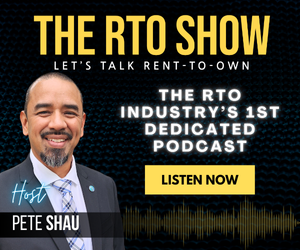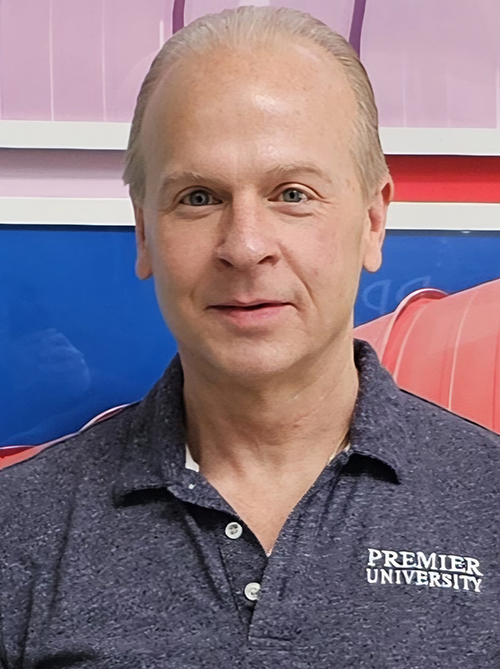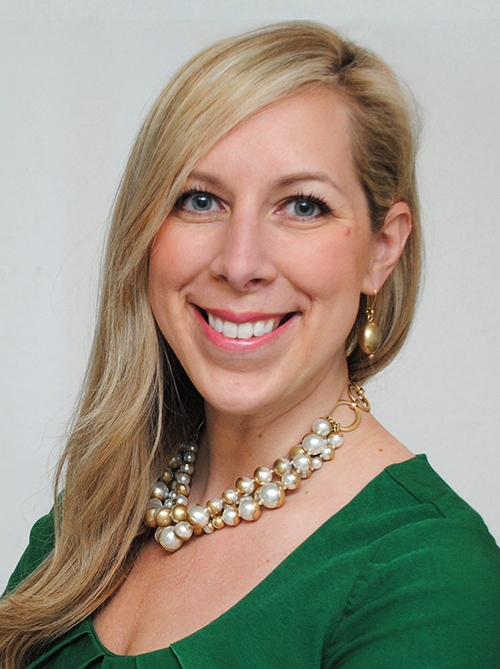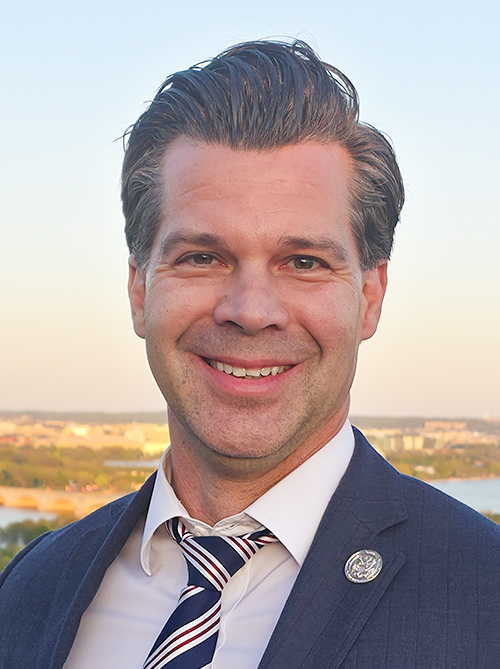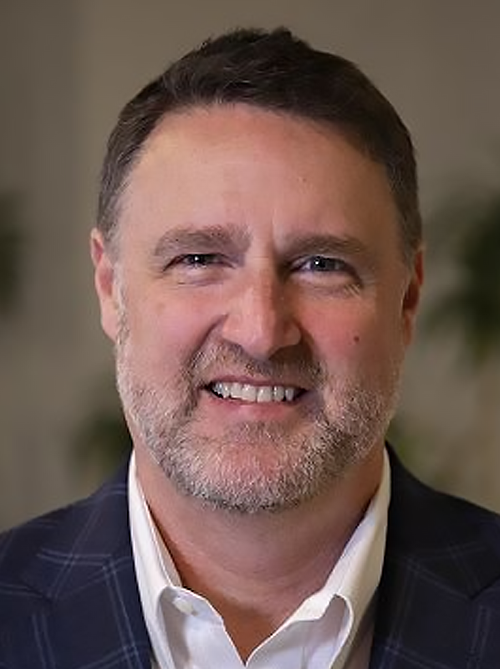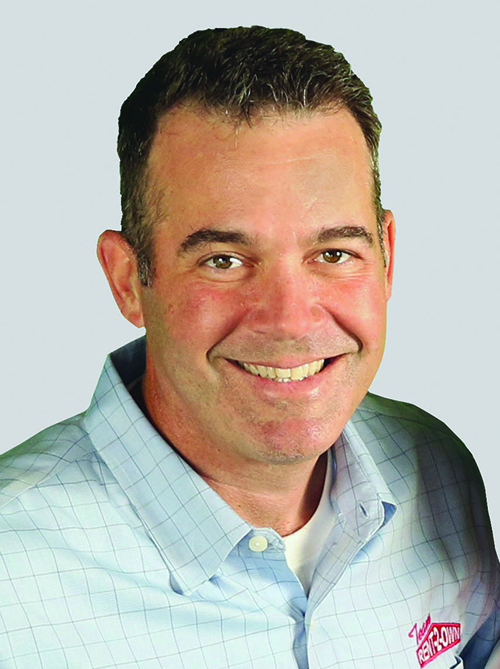
Following seven years of retirement from a 27-year RTO career, Dave Edwards is teed up for another round of rent-to-own success.
If Dave Edwards’ life has had one constant, it’s golf.
His grandfather golfed. His dad golfed. His big brother? Great golfer. Edwards began playing golf at a young age, and as a kid, his family vacations were to Myrtle Beach, South Carolina – home of more than 80 award-winning golf courses. He played in high school and in college, and knowing the game and its etiquette has served him well throughout his professional career.
Edwards has played all of Golf magazine’s 2005 Top 100 Golf Courses worldwide – which only 67 people have ever done – and has also completed the 2003 and 2013 Top 100 lists. And since 2011, he has been a panelist with GolfWeekmagazine, evaluating and rating the architectural merits of golf courses, as well as currently serving as the magazine’s International Ambassador.
“Then along came rent-to-own, and it was like a switch flipped.”
But if there’s one thing Edwards’ life hasn’t been, it’s par for the course.
“I’ve always gravitated more toward the less-normal side of life,” Edwards claims. “My parents were justifiably a little worried about the direction I was going early on in life, because as a kid, I was relatively undisciplined. I was a Type A personality, but I was drifting. And I drank too much, partied too much, I was just really immature. Then along came rent-to-own, and it was like a switch flipped.”
In fact, over his almost three decades in RTO, Edwards has developed a fascinating belief that people who come into the industry as beginners and grow to terrific success all have what he calls “the X factor.”
“A hundred percent of the time, people who have gotten into this business at an entry level operationally and stayed with it and succeeded, they all had something happen in their upbringing that just wasn’t quite the norm,” attests Edwards. “They had a parent who died or who had addiction issues, or their parents divorced, or their single mom had to work three jobs to put food on the table – something. You just never see the captain of the high-school football team who dated the head cheerleader come up through the daily grind of RTO operations to become a multiunit owner.”
So, what is Dave Edwards’ “X factor”? To chat with this affable, garrulous, good-humored, super-sharp, and extremely successful rent-to-own pro today, it’s difficult to determine. Maybe it was his youthful inclination toward fast-and-loose living, maybe it’s just his slight edge of quirkiness, maybe it’s something a little deeper that he doesn’t easily reveal. Read on and decide for yourself – but know that he’s got it, no question.
Dave Edwards was born and spent the first 13 years of his life in a suburb north of Chicago. His dad was a transportation consultant for a Big Eight accounting firm, his mother was a housewife, and he had one older brother. Edwards describes his childhood as rather idyllic upper-middle class, riding bikes and playing stickball with a neighborhood group of friends. Then, his father accepted a job leading a trucking company and moved the family to Rhode Island, where Edwards graduated from high school before returning to the Midwest.
“I attended Washington University in St. Louis, Missouri, which is a very, very good school – but I was not a very, very good student,” Edwards chuckles. “I moved back in with my parents, who were now in Baltimore, and completed my marketing degree at Maryland’s Towson University. During school breaks, I sold cable television doorto- door, so post-graduation, I continued that full-time. But I began dating a girl, and found myself a little embarrassed telling her friends and family that I was a door-todoor salesman for Comcast. So when I came across a newspaper ad seeking manager trainees for Thorn International Rentals in 1990, I was in. I had no clue what this business was about, but I was willing to give it a go.”
Edwards launched his RTO career with Thorn in August of 1990 as an account representative doing deliveries and collections for the Walbrook Junction store in Baltimore – a high-crime neighborhood in what was at the time a high-crime city.
“In the late 1980s and early ‘90s, Baltimore and New Orleans were constantly vying for America’s most dangerous city, and the store I started in was in the middle of the ZIP Code with the highest violent-crime rate in Baltimore,” recalls Edwards. “It was an extremely intense environment. Fortunately, Thorn had brought in a great team of guys – Scott Brown, Derek Lansverk, J.P. Moore, and Greg Ponte – and if I hadn’t been working with them then, I wouldn’t be where I am today.”
Edwards enjoyed the camaraderie, competitiveness, and physicality of rent-to-own, but viewed his work as him-versus-the-customer – if they were past-due with a payment and he had to pick up an item, then “I won,” he asserts. “I had a very, very immature view of the business at the time.”
Nevertheless, Edwards excelled, moving up to assistant manager, then store manager at a location where he almost doubled the number of agreements within the first year. But Edwards’ management approach reflected his still-developing maturity.
“I drove our sales and collections, but was driving our people real hard,” he remembers. “My store didn’t always look the best, and I didn’t always treat my people the best – their happiness was completely secondary to the customers and what they wanted.”
But when Thorn bought Remco, Edwards experienced an epiphany. A Remco trainer speaking to a group of store managers asked, ‘How many of you squeeze in last-minute deliveries on Friday nights because the customer showed up at 6 p.m. and wanted the merchandise immediately?’
“The realization I had completely shifted my paradigm from the customer is number one to the associates are number one.”
“I raised my hand high,” affirms Edwards. “I was like, ‘I do that all the time,’ because that’s what my manager had done to me. And the trainer said, ‘When that happened to you, how did you do those deliveries?’ And it was a light bulb moment for me. I did terrible deliveries, because I was pissed about having to do them. I had plans that night, so I didn’t treat the customer well, didn’t set it up, didn’t demonstrate it, because I was mad. The realization I had completely shifted my paradigm from the customer is number one to the associates are number one. I treated my people better, hired better people, we had a fantastic year. The next year – 1994 – I continued to work really hard, and became a top performer and Store Manager of the Year.”
His performance earned Edwards a move to North Carolina to oversee seven locations. He earned District Manager of the Year and was awarded four more stores, all severe underperformers, in the Charlotte area.
“A lot of my management philosophies have come from mistakes I’ve made, not successes I’ve had,” notes Edwards. “I was tasked with fixing these four stores, so I moved assistant managers from my successful stores up to manage these four train-wreck stores hoping the guys might grow into it. Well, whenever you’re hoping – rather than expecting – someone to grow into a position, it’s a recipe for disaster. I weakened the seven stores I had, and the four stores didn’t improve much. So I moved my best manager to Charlotte, we hired a bunch of terrific manager trainees, we spent a lot of time and energy developing them, and everything began to get better. I learned a valuable lesson: don’t go in trying to put out fires; you have to solve the issues long-term.”
Edwards was moved next to Kansas City, Missouri, to manage a dozen Remco and Rent-A-Center stores. He and his regional director, Kevin LaPierre, formed a friendship, but LaPierre soon left the company to open up the first Aaron’s, Inc. franchise in New England. When his original partner backed out of the three-store deal, LaPierre invited Edwards to join him. Edwards and his fiancée, Samantha, moved to Chicopee, Massachusetts, and beginning in 1998, helped open Aaron’s locations in Springfield, Massachusetts; Wethersfield, Connecticut; and Holyoke, Connecticut – all hugely successful.
“The volume we were doing was so high that we had to tweak the Aaron’s system a little in order to handle it,” Edwards attests. “We were doing about 350 agreement deliveries and over 200 new customer deliveries a month, so most days, we had two trucks doing 10-12 deliveries apiece. It was just a meatgrinder because the activity level was so high.
“One of our key values was the Golden Rule – treat others the way you want to be treated – and especially ensuring our associates came before our customers.”
“By 2000, we had grown to seven stores and were hugely successful operationally,” continues Edwards. “But we weren’t fantastic financially, because we were buying tons of inventory, churning through cash, and we didn’t have a great relationship with our franchisor because they didn’t like us deviating from their system. So we began searching for some back-office help and a better relationship with Aaron’s.”
Enter Charles Smithgall, an 11-store Aaron’s franchisee with capital who happened to be searching for operational help. LaPierre and Edwards merged their stores into Smithgall’s SEI/ Aaron’s Inc., but within a few months, Smithgall revealed that he didn’t feel aligned with LaPierre and wanted to continue with Edwards alone. To say the pairing with Smithgall worked out well is, according to Edwards, a profound understatement.
“Charles was a mentor, a friend, and a great partner,” Edwards confirms. “He took me to Augusta National Golf Club in 2005 to play golf, and I often jokingly say that behind the birth of my child, it was the best day of my life. But in reality, the second- best day of my life was probably the day I partnered with Charles and his son, Chas Smithgall.”
Under the leadership of Edwards and Smithgall, SEI/Aaron’s grew from 18 to 100 stores over the next dozen years – an achievement Edwards is definitely proud of, but he’s even prouder of the culture he was finally experienced enough and mature enough to create for the company.
“All of the experiences I had leading up to that point helped us develop the culture we had at SEI/Aaron’s,” recalls Edwards. “One of our key values was the Golden Rule – treat others the way you want to be treated – and especially ensuring our associates came before our customers. It was a very, very special organization, it was a family, and I believe nurturing that is what eventually got us to 100 stores in 2013 in Concord, New Hampshire. From the early 2000s until we sold SEI, they were really great years for me professionally.”
During his years leading SEI/Aaron’s, Edwards also became an industry leader, serving as an APRO Board Member and President of the New York Rental Dealers Association. Rent-to-own legend “Tiger” John Cleek became a mentor and friend (“what a wonderful guy,” notes Edwards), and Edwards was named APRO Rental Dealer of the Year in 2009 – a remarkable moment, but not his proudest accomplishment.
“What I’m most proud of professionally is the people I’ve helped along the path,” Edwards says. “There’s a long list of people I’ve worked with, and watching them succeed and continue to grow, even beyond this industry, has been life-affirming. I’ve had associates and managers who have contacted me to say, ‘Hey, today I had this happen, and I thought back to when something similar happened at SEI/Aaron’s, how we had that conversation, and you put it into perspective with our values. I used that same principle today to resolve this issue.’
“Management is influence with authority, and leadership is influence without authority,” he continues. “So when someone takes the principles you presented forward, and now they treat people a certain way or deal with a situation a certain way because of it, that’s leadership. And I couldn’t be prouder of that.”
Edwards and Smithgall sold SEI/Aaron’s’ 105 stores to corporate in 2017, and Edwards became an Executive Vice President for the company, overseeing about 250 stores nationwide. But Edwards found the corporate environment wasn’t for him, so he opted to retire the following year and spent the next seven years playing so. Much. Golf. – while also developing interests in world history and art history along the way.
“When I was traveling internationally, some of my destinations were golf-related, but I also saw many of the world’s premier art museums and many of the UNESCO World Heritage Sites (1,223 properties considered to have extraordinary universal cultural or natural value),” notes Edwards. “I had a really great time. And then, a couple of years ago, I decided I wanted to do something else professionally, something where I’m helping more people along the path again. Since I know RTO, that seemed like the best way for me to do that effectively.”
Michael Landry, Vice President of Franchising with Rent-A-Center, heard about Edwards’ interest in re-entering the industry, and reached out to him with an opportunity. Edwards bought in and – along with operating partner John Saladin – launched Golden Rule Rentals, LLC dba Rent-A-Center, taking on seven stores about a year-and-a-half ago in Connecticut markets Edwards was already familiar with.
“I feel we have a good, solid culture now. I think our people are much more engaged, much happier at work, and much prouder to be a part of Golden Rule Rentals.“
“The stores were terribly understaffed, the managers didn’t seem too engaged or happy, the stores themselves didn’t look terrific, and they weren’t getting great support,” Edwards confesses. “All that has changed. I feel we have a good, solid culture now. I think our people are much more engaged, much happier at work, and much prouder to be a part of Golden Rule Rentals. And I believe if you’re financially responsible and treat people right, then good things will happen.”
So with Edwards as CEO and Saldin as President, the appropriately named Golden Rule Rentals is underway. And while the business may not be hitting aces or even eagle status just yet, Edwards’ goal is to grow to 15 stores, and he’s in there swinging.
Meanwhile, his wife of 26 years, Samantha – whom Dave met in the industry – is supportive (as ever) and happy her spouse is back doing what he loves and does so well. A natural athlete with a gregarious personality, she, too, plays a lot of golf, as well as tennis and pickleball. And together, Dave and Sam contribute to their community via work with the Ronald McDonald House Charities of Connecticut and Western Massachusetts, with Dave serving as a Board Member for the nonprofit.
The couple also shares a daughter, Ashley, who is currently working in Boston, Massachusetts, with the State Commission Against Discrimination. A graduate of Massachusetts’ Babson College with a bachelor’s degree in entrepreneurship (go figure), Ashley will be continuing on to Northeastern University School of Law this fall.
“She wants to contribute to society and help people who have less of a voice than she has,” explains Edwards. “And we’re both so, so proud of her.”
Parental pride, while always a personal matter, is also a professional touchstone for Edwards he thinks of often.
“The year I got Manager of the Year for Thorn, my store was in a rough part of Baltimore,” he recalls. “My parents stopped in unexpectedly, and my mom – who had a decorating background – walked around the store examining the merchandising, and my dad talked with some of my people. At the end of their visit, my dad said, ‘Dave, you seem like you got a pretty good operation going on here, and good people.’ Of course, I swelled with pride, and that became my standard for my stores, and it still is. If your parents stopped into your store, would you be proud of the environment of the store and the people you’re working with? If the answer is no, then you need to change it. And if the answer is yes, then keep on doing what you’re doing. So, I am.”




